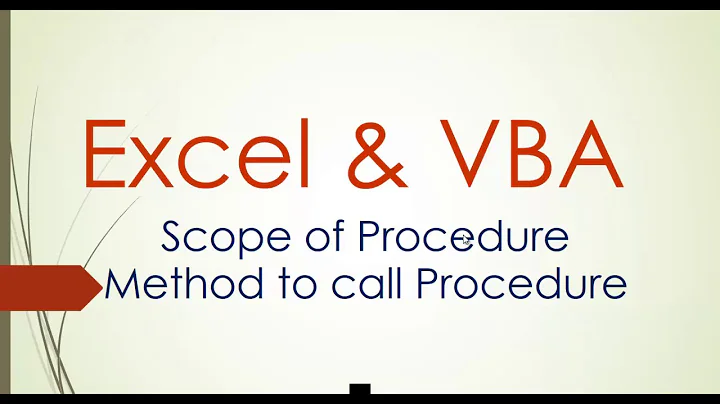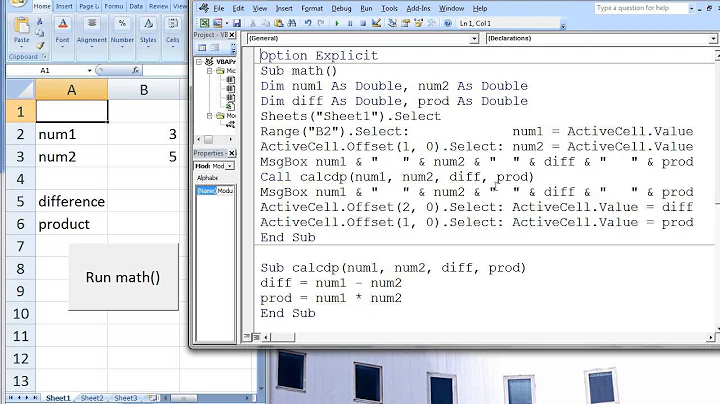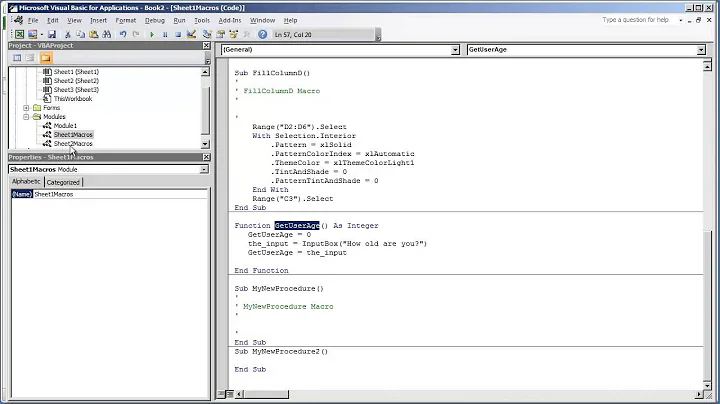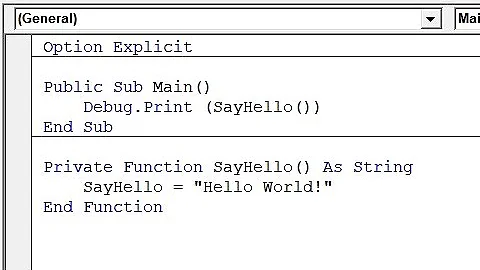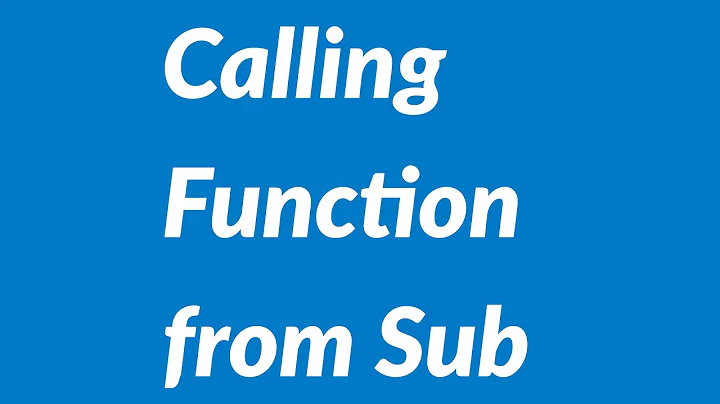Call a VBA Function into a Sub Procedure
Solution 1
Here are some of the different ways you can call things in Microsoft Access:
To call a form sub or function from a module
The sub in the form you are calling MUST be public, as in:
Public Sub DoSomething()
MsgBox "Foo"
End Sub
Call the sub like this:
Call Forms("form1").DoSomething
The form must be open before you make the call.
To call an event procedure, you should call a public procedure within the form, and call the event procedure within this public procedure.
To call a subroutine in a module from a form
Public Sub DoSomethingElse()
MsgBox "Bar"
End Sub
...just call it directly from your event procedure:
Call DoSomethingElse
To call a subroutine from a form without using an event procedure
If you want, you can actually bind the function to the form control's event without having to create an event procedure under the control. To do this, you first need a public function in the module instead of a sub, like this:
Public Function DoSomethingElse()
MsgBox "Bar"
End Function
Then, if you have a button on the form, instead of putting [Event Procedure] in the OnClick event of the property window, put this:
=DoSomethingElse()
When you click the button, it will call the public function in the module.
To call a function instead of a procedure
If calling a sub looks like this:
Call MySub(MyParameter)
Then calling a function looks like this:
Result=MyFunction(MyFarameter)
where Result is a variable of type returned by the function.
NOTE: You don't always need the Call keyword. Most of the time, you can just call the sub like this:
MySub(MyParameter)
Solution 2
Calling a Sub Procedure – 3 Way technique
Once you have a procedure, whether you created it or it is part of the Visual Basic language, you can use it. Using a procedure is also referred to as calling it.
Before calling a procedure, you should first locate the section of code in which you want to use it. To call a simple procedure, type its name. Here is an example:
Sub CreateCustomer()
Dim strFullName As String
strFullName = "Paul Bertrand Yamaguchi"
msgbox strFullName
End Sub
Sub Exercise()
CreateCustomer
End Sub
Besides using the name of a procedure to call it, you can also precede it with the Call keyword. Here is an example:
Sub CreateCustomer()
Dim strFullName As String
strFullName = "Paul Bertrand Yamaguchi"
End Sub
Sub Exercise()
Call CreateCustomer
End Sub
When calling a procedure, without or without the Call keyword, you can optionally type an opening and a closing parentheses on the right side of its name. Here is an example:
Sub CreateCustomer()
Dim strFullName As String
strFullName = "Paul Bertrand Yamaguchi"
End Sub
Sub Exercise()
CreateCustomer()
End Sub
Procedures and Access Levels
Like a variable access, the access to a procedure can be controlled by an access level. A procedure can be made private or public. To specify the access level of a procedure, precede it with the Private or the Public keyword. Here is an example:
Private Sub CreateCustomer()
Dim strFullName As String
strFullName = "Paul Bertrand Yamaguchi"
End Sub
The rules that were applied to global variables are the same:
Private: If a procedure is made private, it can be called by other procedures of the same module. Procedures of outside modules cannot access such a procedure.
Also, when a procedure is private, its name does not appear in the Macros dialog box
Public: A procedure created as public can be called by procedures of the same module and by procedures of other modules.
Also, if a procedure was created as public, when you access the Macros dialog box, its name appears and you can run it from there
Solution 3
if pptCreator is a function/procedure in the same file, you could call it as below
call pptCreator()
Solution 4
Procedures in a Module start being useful and generic when you pass in arguments.
For example:
Public Function DoSomethingElse(strMessage As String)
MsgBox strMessage
End Function
Can now display any message that is passed in with the string variable called strMessage.
Related videos on Youtube
TAD Innovative minds
I am a perpetual student, and always trying to learn something new. For those of you to take the time to answer, even when it requires helping the question along, I for one appreciate that effort greatly! I am currently mostly interested in nodejs, python, java, elasticsearch, kafka, forensics and ethical hacking.
Updated on September 19, 2020Comments
-
TAD Innovative minds over 3 years
I know this is a simple question for someone out there, but I have never really used function module at all because I did not understand what they were.
So I have a whole bunch of things I can use this for (cut down on redundancy), but I want to know how I call into a sub (like a button click) procedure from a form.
I tried this...
Sub Command_Click() Call "pptCreator" End SubI know that is pretty bad, but I have no idea how to bring this into a procedure.
-
TAD Innovative minds almost 15 yearsSo does that mean instead of "calling" the function into the form's sub, I would being "calling the form into the function module?? I think i understand, but am still a little confused. I have a powerpoint automation procedure that I want to use all throughout the db, because the purpose of this db is tracking metrics, and the end game for the client is presentations (mostly power point). I have different sets of code scattered throughout different forms that acomplish this for me, but mostly it's all repetitive. From a recent explaination the Functions in modules will help me.....
-
TAD Innovative minds almost 15 yearseliminate most of the repetitive coding by calling a "certain set of code" from a module function. But it operates off the forms. So the event trigger is still "button clicks" from the forms. It sounds like I have the idea in reverse, that I have to call the form sub to the function? instead of the other way around. Sorry I know its pretty obvious I am at best a novice at this... thanks very much for your help.
-
TAD Innovative minds almost 15 yearsi wrote the function in a module and saved it as pptCreator. then I go to one of the forms that I want to use this in conjunction with, and the event trigger is a button click. so... Public Sub Command1_click () call pptCreator end sub is this correct? i tried using it and I get a compile error stating that expected end of statements; not module thanks for the help
-
 Yinda Yin almost 15 yearsIn your case I think you just need to put your sub in a module, make the sub public, and then call it: call pptCreator. See "To call a subroutine in a module from a form" in this answer.
Yinda Yin almost 15 yearsIn your case I think you just need to put your sub in a module, make the sub public, and then call it: call pptCreator. See "To call a subroutine in a module from a form" in this answer. -
TAD Innovative minds almost 15 yearsok. how do I call a "function" into a form's sub event (like a button click)? the module contains a function. can i call that the same way as a sub? i have tried over and over and i get a host of error messages. this is code that i found, and I am not sure if it will be useful to me or not, but I cannot even get past compile errors. thanks
-
Mark3308 almost 15 yearsA forms sub event as you call it is not a function it is a sub procedure. Also an event in the form is Private so it can only be called from within the form class. To call a form from out side then a procedure has to be declared as Public. Also Remember a function always has a return value and a sub procedure does not.
